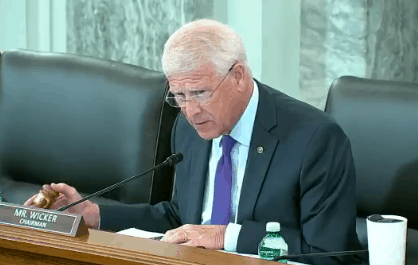
Sen. Wicker
WASHINGTON (Reuters) – A U.S. Senate hearing to reform an internet law and hold tech companies accountable for how they moderate content quickly turned into a political scuffle as lawmakers not only went after the companies but also attacked each other.
Lawmakers are split on ways to hold Big Tech accountable under Section 230 of the Communications Decency Act – which protects companies from liability over content posted by users but also lets the firms shape political discourse.
Republican lawmakers used most of their time during the hearing to accuse the companies of selective censorship against conservatives. Democrats primarily focused on insufficient action against misinformation that interferes with the election.
In response to a limited number of questions discussing the law, the chief executives of Twitter, Facebook, and Google said it was crucial to free expression on the internet. They said Section 230 gives them the tools to strike a balance between preserving free speech and moderating content, even as they appeared open to suggestions the law needs moderate changes.
All three CEOs also agreed the companies should be held liable if the platforms act as a publisher but denied being the referees over political speech – a claim that angered some Republicans.
Senator Ted Cruz went after Twitter’s Jack Dorsey after the CEO said Twitter has no influence over elections.
“Who the hell elected you and put you in charge of what the media are allowed to report and what the American people are allowed to hear,” Cruz said, referring to the platform’s decision to block stories from the New York Post about the son of Democratic presidential candidate Joe Biden. Ahead of the hearing, the senator released a picture on Twitter titled “Free Speech showdown Cruz vs Dorsey” that showed him and Twitter’s Dorsey pitted against each other.
Democratic Senator Brian Schatz said he did not have any questions, calling the hearing “nonsense”.
“This is bullying and it is for electoral purposes,” he said.
Other Democrats including Tammy Baldwin, Ed Markey and Amy Klobuchar also said the hearing was held to help President Donald Trump’s re-election effort.
Trump, who alleges the companies’ stifle conservative voices, tweeted “Repeal Section 230!” during the hearing.
Twitter’s Dorsey, who drew the most amount of criticism from Republicans, warned the committee that eroding the foundation of Section 230 could significantly hurt how people communicate online. Pichai said Google operates without political bias and that doing otherwise would be against its business interests.
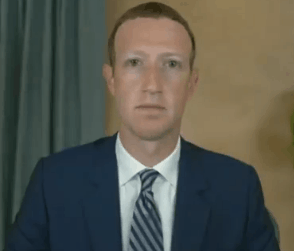
Zuckerberg at today’s hearing.
Zuckerberg, who briefly had difficulty with his internet connection at the start of the hearing, said he supports changing the law but also warned that tech platforms are likely to censor more to avoid legal risks if Section 230 is repealed. Biden has expressed support for revoking the law.
NO MORE “FREE PASS”
Republican Senator Roger Wicker, who chairs the committee, said it was important to shield companies from liability without giving them the ability to censor content they dislike.
“The time has come for that free pass to end,” he said.
Wicker also criticized Twitter’s decision to block the New York Post stories about Biden’s son and Facebook’s move to limit their reach.
He and other senators such as Cory Gardner went after Twitter for not taking down tweets from world leaders that allegedly spread misinformation but going aggressively after Republican President Donald Trump’s tweets.
U.S. lawmakers are not the only ones pushing for reform. The European Union’s executive Commission is drafting a new Digital Services Act that, in addition to tackling market abuses by dominant platforms, would also address liability for harmful or illegal content. Competition Commissioner Margrethe Vestager is due to unveil her proposals on Dec. 2.
Reporting by Nandita Bose and David Shepardson in Washington; Additional reporting by Diane Bartz in Washington and Douglas Busvine in Frankfurt; editing by Kirsten Donovan and Lisa Shumaker


 Subscribe
Subscribe Even with the threat of COVID-19 and a virtual nationwide work-from-home initiative, the new owners of Frontier Communications’ network in Washington, Oregon, Montana and Idaho are moving rapidly to repair persistent network issues, create a backup network, and lay the foundation to bring fiber to the home service to 85% of its customers over the next three years.
Even with the threat of COVID-19 and a virtual nationwide work-from-home initiative, the new owners of Frontier Communications’ network in Washington, Oregon, Montana and Idaho are moving rapidly to repair persistent network issues, create a backup network, and lay the foundation to bring fiber to the home service to 85% of its customers over the next three years.
 Among the first towns to get fiber service are Kellogg, Moscow, and Coeur d’Alene — all in Idaho. Work has already commenced and is expected to be finished by fall. Ziply wants to keep construction costs as low as possible, so it intends to do aerial deployment of fiber by wrapping the optical cable around existing copper wire telephone cables already on the pole. This process, known as “overlashing” will simplify installation by not requiring additional space to place fiber cables next to existing telephone wiring or going to the effort of removing the existing copper wiring, which raises costs.
Among the first towns to get fiber service are Kellogg, Moscow, and Coeur d’Alene — all in Idaho. Work has already commenced and is expected to be finished by fall. Ziply wants to keep construction costs as low as possible, so it intends to do aerial deployment of fiber by wrapping the optical cable around existing copper wire telephone cables already on the pole. This process, known as “overlashing” will simplify installation by not requiring additional space to place fiber cables next to existing telephone wiring or going to the effort of removing the existing copper wiring, which raises costs.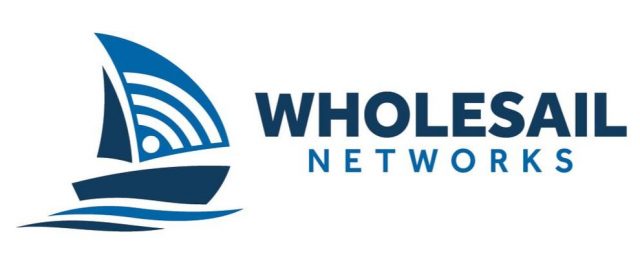 To further speed fiber upgrades, Ziply acquired Wholesail Networks, already contracted to manage fiber network design for Ziply. Company officials quickly identified multiple weak spots in Frontier’s network, particularly relating to its resiliency when fiber cables were cut or copper wiring was stolen. Ziply is building in network redundancy, with each portion of its network served by at least two sets of fiber cabling and identical equipment in each of more than 130 central switching offices. In many markets, Ziply will maintain at least three redundant fiber connections to make certain if one (or two) networks go down, customers can still be served by a third with no interruption in service.
To further speed fiber upgrades, Ziply acquired Wholesail Networks, already contracted to manage fiber network design for Ziply. Company officials quickly identified multiple weak spots in Frontier’s network, particularly relating to its resiliency when fiber cables were cut or copper wiring was stolen. Ziply is building in network redundancy, with each portion of its network served by at least two sets of fiber cabling and identical equipment in each of more than 130 central switching offices. In many markets, Ziply will maintain at least three redundant fiber connections to make certain if one (or two) networks go down, customers can still be served by a third with no interruption in service. A stray bullet that hit a fiber optic line in late May eventually disrupted Altice/Suddenlink service in eastern North Carolina and caused a minor outage for the Beaufort County 911 Communication Center.
A stray bullet that hit a fiber optic line in late May eventually disrupted Altice/Suddenlink service in eastern North Carolina and caused a minor outage for the Beaufort County 911 Communication Center.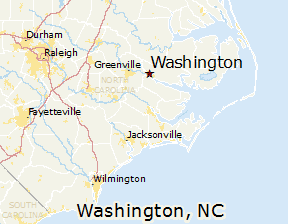 Suddenlink first detected the problem on a Saturday in late May, but did not identify the fiber line as “shot” until a day later, at which point WPD officers responded to the scene. The cable company evidently did not start repairs until after a widespread service outage began.
Suddenlink first detected the problem on a Saturday in late May, but did not identify the fiber line as “shot” until a day later, at which point WPD officers responded to the scene. The cable company evidently did not start repairs until after a widespread service outage began. Frontier Communications is
Frontier Communications is 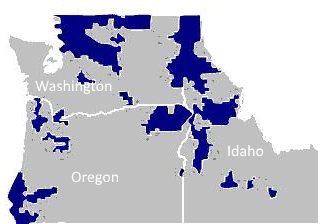
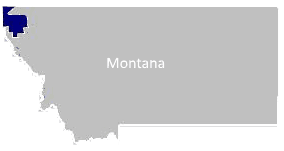
 Comcast and an independent contractor the cable giant relied on to perform repairs and installations in northern California and Washington have
Comcast and an independent contractor the cable giant relied on to perform repairs and installations in northern California and Washington have 